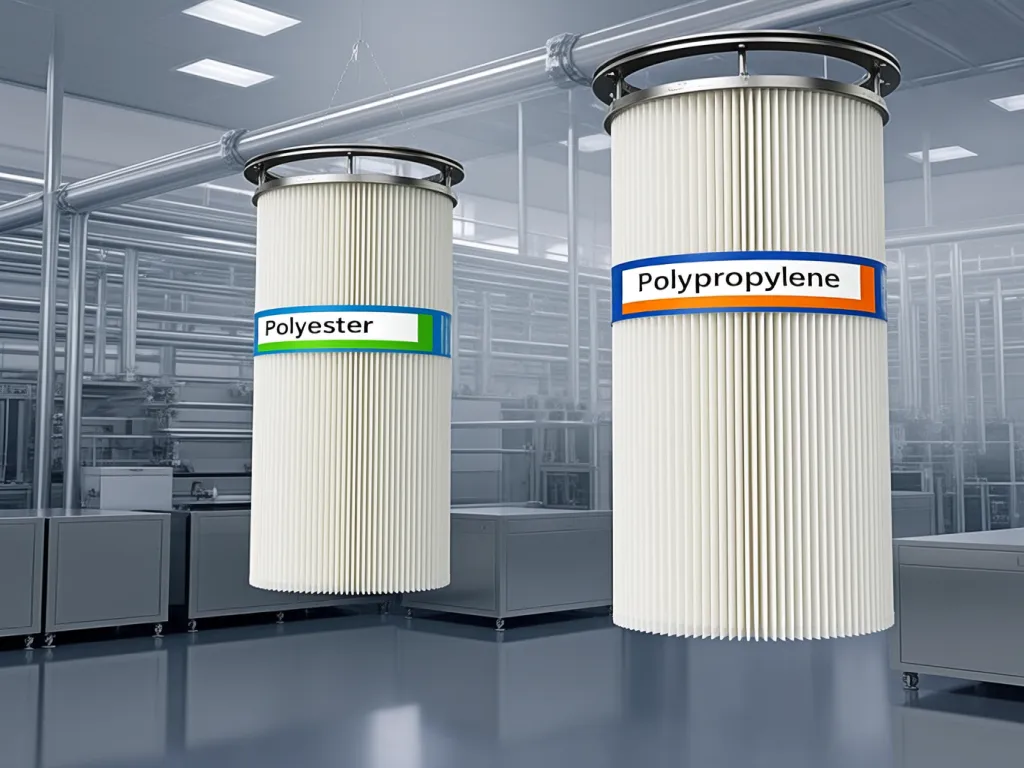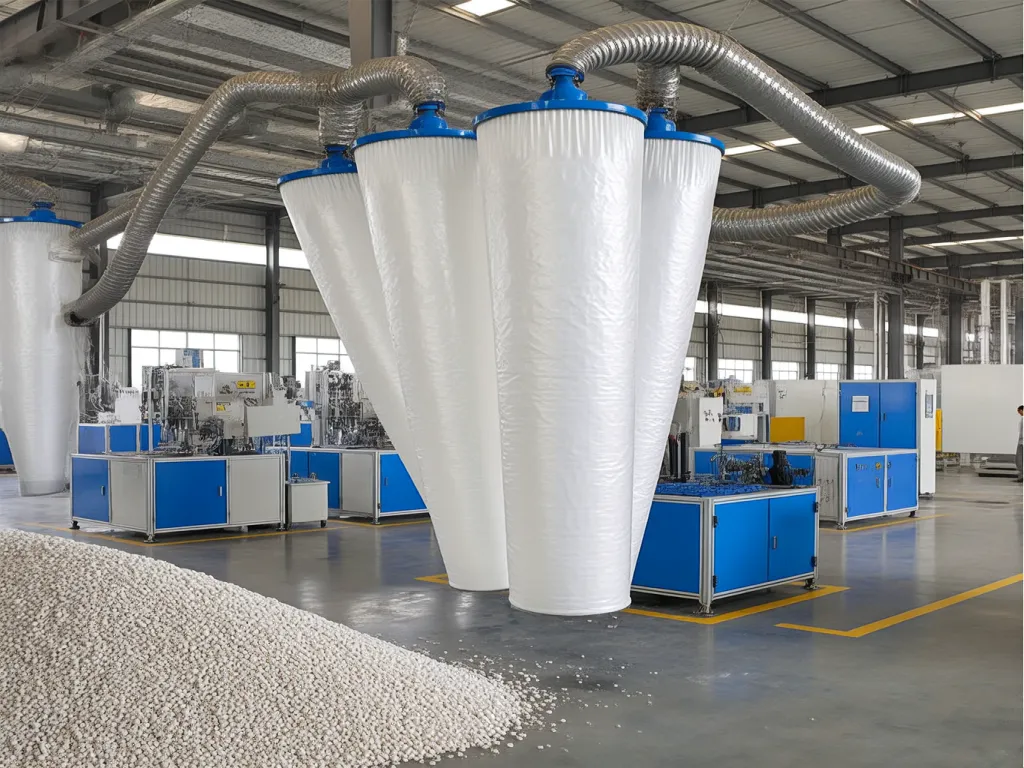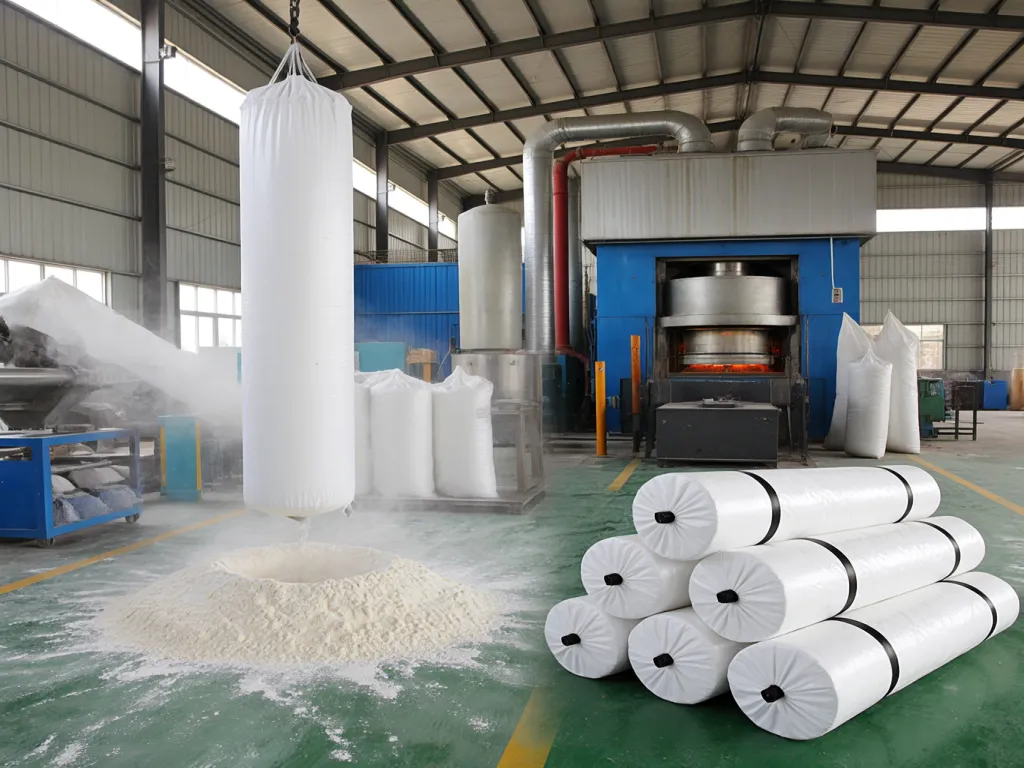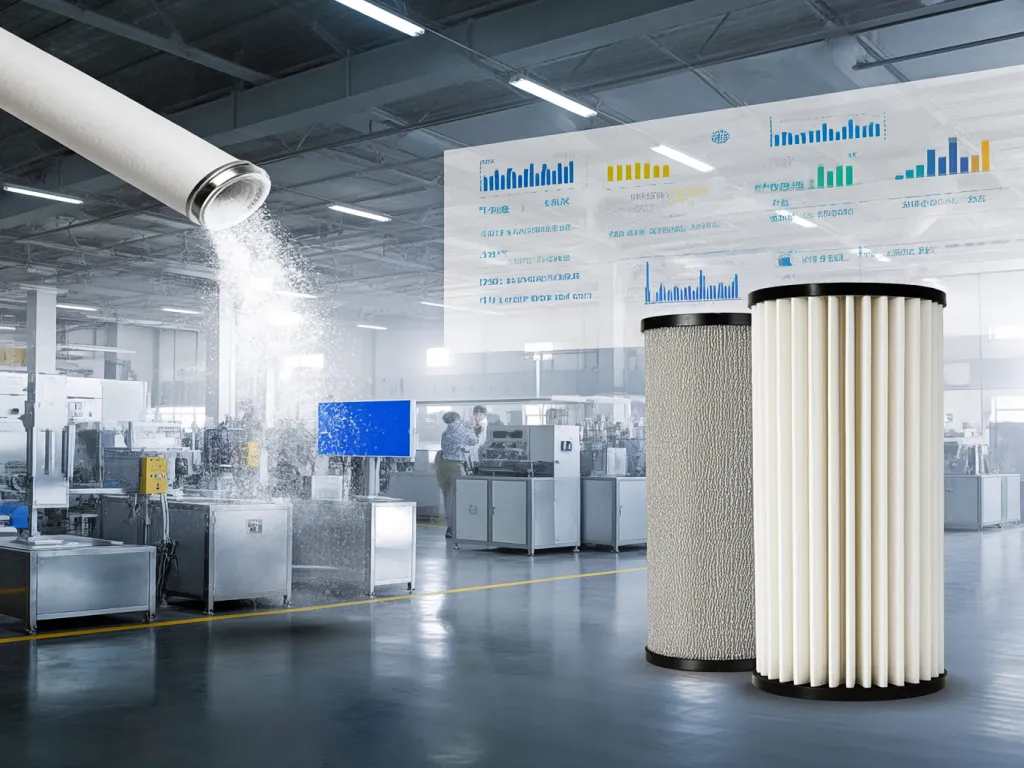Polyester vs Polypropylene: Industrial Vacuum Filter Bag Guide

Navigating the world of industrial vacuum cleaner filter bags can be tricky. With a myriad of materials claiming superiority, how do you choose the right one for your specific needs? Whether you’re battling stubborn dust in a manufacturing plant or fine particles in a pharmaceutical setting, the material of your filter bag matters. Today, we’re diving deep into the debate: polyester vs polypropylene for industrial vacuum cleaner filter bags. Which one will emerge as your go-to choice?

Polyester Fiber Filter Bags: A Deep Dive into Efficiency, Durability, Cost-Effectiveness, and Industrial Applications
First off, filtration efficiency is where polyester truly shines.
When it comes to industrial vacuum cleaner filter bags, polyester fiber stands out as a go-to material for a myriad of reasons. Let’s delve into why polyester might just be the hero your industrial setup needs, exploring its filtration efficiency, durability, cost-effectiveness, and real-world applications. First off, filtration efficiency is where polyester truly shines. With its fine fiber structure, polyester filter bags can trap a wide range of particulate sizes, from coarse dust to fine powders. This means cleaner air output and a healthier work environment. But how does it stack up against other materials? Well, polyester’s efficiency is often on par with, if not superior to, many alternatives, especially when dealing with mixed particle sizes. For a closer look at high-efficiency filter bags tailored for dust collection, consider exploring high-efficiency industrial filter bags.
Now, onto durability.
Now, onto durability. Polyester is known for its robustness, able to withstand the rigors of industrial use without compromising performance. It resists abrasion, chemicals, and moisture, making it a reliable choice in harsh environments. Imagine a factory floor where dust and debris are constantly being generated; a polyester filter bag can handle the frequent cleaning cycles without tearing or degrading, ensuring consistent airflow and filtration.
Cost-effectiveness is another big win for polyester.
Cost-effectiveness is another big win for polyester. While the initial investment might be slightly higher than some budget options, the long-term savings are undeniable. Polyester filter bags have a longer lifespan, reducing the frequency of replacements. Plus, their efficient filtration means less energy is wasted on clogged filters, translating to lower operational costs over time. So, you’re not just saving on bag replacements; you’re also cutting down on energy bills. For a broader perspective on cost-effective and efficient filtration solutions, you may want to check out industrial filter bags for dust and liquid filtration.
But where does polyester really excel in the industrial landscape?
But where does polyester really excel in the industrial landscape? Let’s look at some application cases. In the automotive industry, polyester filter bags are a staple in paint booths and welding fumes extraction systems. Their ability to capture fine particles ensures a clean finish on vehicles and protects workers from harmful airborne contaminants. In the food processing sector, polyester’s resistance to moisture and chemicals makes it ideal for filtering dust from grain handling, flour milling, and sugar processing. And in the pharmaceutical industry, where cleanliness is paramount, polyester filter bags provide the necessary filtration to maintain sterile environments.
So, when should you opt for polyester filter bags?
So, when should you opt for polyester filter bags? If your industrial setup involves mixed particle sizes, frequent cleaning cycles, or exposure to moisture and chemicals, polyester is a strong contender. Its combination of filtration efficiency, durability, and cost-effectiveness makes it a versatile choice across various industries. But don’t just take our word for it. Consider the specific needs of your operation. Are you looking for a filter bag that can handle high volumes of dust without clogging? Do you need a material that can withstand the wear and tear of daily use? Or perhaps you’re focused on reducing long-term costs? Whatever your priorities, polyester filter bags offer a compelling solution.
In conclusion, polyester fiber filter bags are a powerhouse in the industrial vacuum cleaner world.
In conclusion, polyester fiber filter bags are a powerhouse in the industrial vacuum cleaner world. Their filtration prowess, durability, and cost-effectiveness make them a top pick for a wide range of applications. Whether you’re in automotive, food processing, pharmaceuticals, or any other industry that demands clean air, polyester has got you covered. So, next time you’re in the market for industrial vacuum cleaner filter bags, give polyester a serious look. You might just find it’s the perfect fit for your needs.

Polypropylene Filter Bags: Exploring Filtration Performance, Chemical Stability, and Temperature Resistance, with a Comparison of Advantages and Limitations in Specific Dust Handling
When it comes to industrial vacuum cleaner filter bags, polypropylene stands out as a material with distinct characteristics. Let’s dive deep into its filtration performance, chemical stability, and temperature resistance to understand how it fares in specific dust – handling scenarios.
Polypropylene filter bags excel in filtration performance. Their unique molecular structure allows them to capture a wide range of particulate sizes effectively. The fibers of polypropylene create a dense, yet porous network that can trap fine dust particles as small as a few microns. This makes them ideal for industries where the control of minute airborne contaminants is crucial, such as in pharmaceutical manufacturing or electronics assembly. For instance, in a cleanroom environment, polypropylene filter bags can significantly reduce the number of airborne particles, ensuring a high – quality production process.
Chemical stability is another key feature of polypropylene. It is highly resistant to a variety of chemicals, including acids, alkalis, and solvents. This property makes it a reliable choice for industries that deal with corrosive substances. In chemical processing plants, where the air may contain traces of aggressive chemicals, polypropylene filter bags can withstand the harsh environment without degrading. They maintain their structural integrity and filtration efficiency over time, reducing the need for frequent replacements and saving costs in the long run. For further reading on chemical resistance in industrial materials, you may refer to this chemical resistance guide.
Temperature resistance is also a notable aspect of polypropylene. It can operate effectively within a relatively wide temperature range, typically from – 40°C to 120°C. This versatility allows it to be used in both cold storage facilities and high – temperature industrial processes. For example, in a foundry where the air is filled with hot metal dust, polypropylene filter bags can handle the elevated temperatures without melting or losing their shape. However, it’s important to note that extreme temperatures outside this range can affect the performance of polypropylene filter bags.
Now, let’s compare the advantages and limitations of polypropylene filter bags in specific dust – handling situations. One of the major advantages is their cost – effectiveness. Compared to some other high – performance filter materials, polypropylene is relatively inexpensive. This makes it an attractive option for small to medium – sized industrial facilities with budget constraints. Additionally, its lightweight nature simplifies installation and maintenance.
On the flip side, polypropylene filter bags have limitations. In environments with extremely high temperatures or where there are strong oxidizing agents, their performance may be compromised. For example, in a glass – melting furnace where the air temperature can exceed 120°C, polypropylene filter bags may not be the best choice. Also, while they are resistant to many chemicals, certain aggressive organic solvents can cause damage over time. Another limitation is their relatively lower filtration efficiency for very fine, sub – micron particles compared to some specialized filter materials like PTFE.
Advantages in Specific Dust – Handling Scenarios
In the food processing industry, polypropylene filter bags are a great fit. The air in food production facilities often contains fine flour dust, spices, and other particulates. Polypropylene’s ability to capture these fine particles effectively helps maintain a clean and hygienic environment. Moreover, its chemical stability ensures that it doesn’t react with the food ingredients, preventing any contamination. In woodworking shops, where sawdust is a major concern, polypropylene filter bags can efficiently trap the dust, reducing the risk of respiratory problems for workers and keeping the workspace clean.
Limitations in Specific Dust – Handling Scenarios
In the aerospace industry, where the use of high – temperature adhesives and composites is common, the air may contain volatile organic compounds (VOCs) and high – temperature particulates. Polypropylene filter bags may not be able to handle the high temperatures and the chemical reactivity of some of these substances. Similarly, in semiconductor manufacturing, where ultra – clean environments are required and the air may contain highly reactive gases, polypropylene’s limitations become apparent. In such cases, more advanced and expensive filter materials may be necessary.

Comprehensive Comparison and Selection Guide: Choosing the Right Industrial Vacuum Cleaner Filter Bag Material Based on Efficiency, Cost, and Durability
When it comes to selecting the perfect industrial vacuum cleaner filter bag, the decision isn’t just about picking a bag; it’s about choosing a material that aligns perfectly with your operational needs. You’re not alone in this journey—countless industrial professionals face the same dilemma. So, how do you navigate through the sea of options to find the one that fits just right? Let’s dive into a detailed comparison of polyester and polypropylene filter bags, focusing on three critical factors: filtration efficiency, cost-effectiveness, and durability.
First up, filtration efficiency. This is where the rubber meets the road. Polyester filter bags boast an impressive ability to capture fine particles, thanks to their dense fiber structure. They’re like the fine mesh nets of the filtration world, trapping even the tiniest of dust particles. On the other hand, polypropylene bags, while efficient, may not match the polyester’s finesse in capturing ultra-fine dust. However, they excel in handling moist or oily particles, where polyester might struggle. So, if your industry deals with a lot of fine, dry dust, polyester might be your go-to. But for environments with wet or oily residues, polypropylene could be the hero you need.
Next, let’s talk cost. Budget constraints are a reality for most businesses. Polyester filter bags, while offering superior filtration, often come with a higher price tag. This initial investment, however, can be offset by their longer lifespan and lower maintenance costs. Polypropylene bags, being more budget-friendly upfront, might seem attractive. But remember, cheaper isn’t always better. Consider the total cost of ownership, including replacement frequency and potential downtime costs. Sometimes, investing a bit more initially can save you a bundle in the long run.
Durability is another crucial aspect. Polyester bags are known for their robustness, withstanding high temperatures and chemical exposures better than their polypropylene counterparts. They’re like the tough cookies of the filter bag world, lasting longer in harsh conditions. Polypropylene bags, while durable in their own right, might not hold up as well under extreme temperatures or chemical attacks. So, if your industrial setting involves high heat or corrosive substances, polyester is your sturdy companion.
Now, let’s put it all together. Choosing the right material depends on your specific needs. Are you after maximum filtration efficiency, even if it means a higher initial cost? Or is budget your primary concern, with durability and efficiency taking a backseat? Maybe you’re in an environment where chemical resistance is paramount. Whatever your scenario, there’s a filter bag material out there that’s just right for you.
Remember, it’s not about finding the ‘best’ material in general; it’s about finding the best material for your unique situation. Take a moment to assess your industrial environment, the type of dust you’re dealing with, your budget constraints, and your long-term goals. With this information in hand, you’re well-equipped to make an informed decision.
Still feeling overwhelmed? Don’t worry, you’re not alone. Many buyers find themselves in the same boat. That’s why consulting with a trusted supplier or manufacturer can be invaluable. They can provide tailored advice based on your specific needs, helping you navigate through the options and find your perfect match.
Polyester vs. Polypropylene: A Closer Look at Filtration Efficiency
When it comes to filtration efficiency, polyester and polypropylene have distinct strengths. Polyester’s dense fiber structure makes it a champion in capturing fine particles, making it ideal for industries like pharmaceuticals or electronics manufacturing where cleanliness is paramount. Polypropylene, while slightly less efficient in fine particle capture, shines in environments with moist or oily residues, thanks to its hydrophobic nature. This makes it a great choice for food processing or automotive industries where such residues are common.
Cost Considerations: Balancing Initial Investment and Long-Term Savings
Cost is always a factor in decision-making. Polyester filter bags, with their superior filtration and durability, often come at a higher initial cost. However, their longer lifespan and lower maintenance needs can translate into significant savings over time. Polypropylene bags, being more affordable upfront, might seem like a bargain. But consider the potential costs of frequent replacements and downtime due to less efficient filtration. Sometimes, spending a bit more initially can lead to substantial long-term savings.
Durability Showdown: Polyester’s Robustness vs. Polypropylene’s Resilience
Durability is a key consideration, especially in harsh industrial environments. Polyester bags are known for their ability to withstand high temperatures and chemical exposures, making them a reliable choice for industries like metalworking or chemical processing. Polypropylene bags, while durable, might not hold up as well under extreme conditions. They’re more suited for milder environments where chemical resistance isn’t a primary concern. Choosing the right material based on durability ensures your filter bags last longer, reducing replacement costs and downtime.
Selecting the ideal industrial vacuum cleaner filter bag material isn’t just about performance; it’s about optimizing efficiency and cost-effectiveness for your unique industrial environment. After dissecting the pros and cons of polyester and polypropylene, you’re now equipped to make an informed decision. Remember, the right choice can significantly enhance your industrial cleaning processes. So, have you pinpointed the perfect filter bag material for your needs? Don’t stop here—explore our range of industrial filtration solutions and take the first step towards a cleaner, more efficient workspace today!

